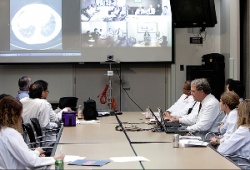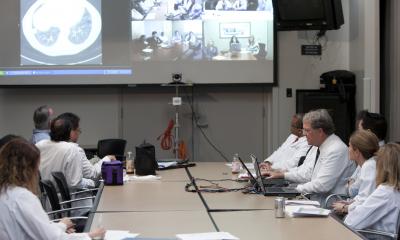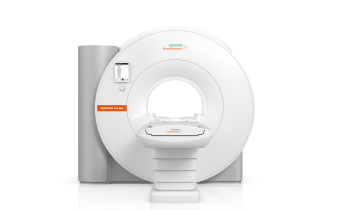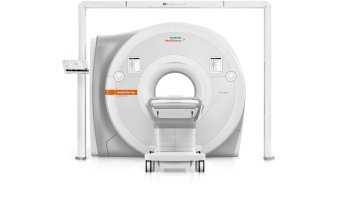Re-evaluating the multidisciplinary approach to cancer care
Structuring a tumour board
A 2012 study analysing the care of cancer patients in the USA in 138 Veterans’ Administration hospitals (pub: Journal of the National Cancer Institute) questions the effectiveness of tumour board review. The study measured effectiveness by comparing the presence of tumour review boards with stage-specific quality of care and patient outcomes.


When first introduced, tumour boards promised cancer patients input from a variety of medical experts that might include social workers and palliative care specialists as well as surgeons, pathologists, medical oncologists and radiation oncologists. The goal of these multidisciplinary boards was to harness the expertise of different specialists to more accurately identify the stage of the cancer and to devise the most effective course of treatment. Bringing together experts from different fields of cancer medicine would presumably overcome the possibility of ‘specialty bias’, producing the most integrated care possible. However, a recent study suggests that this promise has gone unfulfilled. With this new information, the status of tumour boards in the USA has become the subject of increased scrutiny.
The study, designed by Nancy L Keating, of the Department of Health Care Policy at Harvard Medical School, and her colleagues, ‘surveyed 138 VA medical centres about the presence of tumour boards and linked cancer registry and administrative data to assess receipt of stage-specific recommended care, survival, or use for patients with colorectal, lung, prostate, hematologic, and breast cancers’. The study examined the records of patients diagnosed from 2001 to 2004, using 27 measures of quality and outcome to analyse those patients’ data through 2005. They ultimately found ‘little association of multidisciplinary tumour boards with measures of use, quality, or survival’.
Titled Tumour Boards and the Quality of Cancer Care, the study does not recommend dispensing with multidisciplinary review altogether, noting that ‘tumour boards likely vary in their efficacy’ depending on factors such as the expertise of their members, their structure, and other functional components. ‘Additional research is needed to understand the structure and format of tumour boards that lead to the highest quality care,’ the researchers conclude.
The American College of Surgeons, whose Commission on Cancer sets the national standards for tumour boards, has already recognised this need. As their ‘Cancer Program Standards 2012: Ensuring Patient-Centred Care’ states, each board features a Quality Improvement Coordinator, whose role is to evaluate tumour boards’ effectiveness in improving patient outcomes. These coordinators make an annual report presenting their research. They also have the power to ‘recommend corrective action if activity falls below the annual goal or requirements’.
Other experts such as Tamar H Taddei, of Yale University School of Medicine’s Department of Internal Medicine, agree that Keating’s study does not foreclose on the promise of multidisciplinary reviews for cancer patients.
In his essay on hepatocellular carcinoma (HCC) in the Journal of Clinical Gastroenterology, Taddei also argues that multidisciplinary opinions could have special benefits in terms of treating this particular disease – ‘the fastest growing cause of cancer death in the US’. Because HCC is a heterogeneous disease and ‘aris[es] in a damaged organ’, it poses ‘unique diagnostic criteria and treatment modalities’. According to Taddei, this complex cancer requires ‘a keen understanding of the benefits, risks, limitations, and trade-offs of potentially curative, bridging, and palliative therapies’. He asserts that a multidisciplinary team ‘is an essential forum for each specialty to lend their expertise to the collective decision making involved in formulating a plan of care’.
Another group of physicians from Feinberg School of Medicine’s Surgical Outcomes and Quality Improvement Centre at Northwestern University take up the cause of tumour boards in an invited critique in JAMA Surgery online (20/3/2013). Drawing on research by the Mayo Clinic’s Nabil Wasif and colleagues, Feinberg’s doctors Karen Sherman, Jeffrey D Wayne and Karl Y Bilimoria conclude from that study that ‘all sarcoma patients should be managed by a multidisciplinary team with expertise in sarcoma to mitigate individual physician and physician specialty treatment bias’.
Taddei and Sherman et al. argue for the continued viability of multidisciplinary teams in terms of diagnosing and treating specific cancers. Yet Taddei also remarks of the Keating study that it suggests a need for more ‘standardised processes’, to institutionalise best practices across the board. In all of these cases, the practice of tumour board review does not seem to be in jeopardy, but its current function and structure invites room for improvement.
Finally, while most of the controversy seems to surround the relationship between tumour boards and patient outcomes, the debate has largely overlooked one of their early primary goals: to ‘provide a forum for the continuing education of medical staff and health professionals’, according to Cancer Care Ontario’s ‘Multidisciplinary Cancer Conference Standards in Review’ 2006 report.
The educational aspect of these boards figured even more prominently in a 1988 report by the USA’s Government Accounting Office on ‘Encouraging the Use of Breakthroughs’ in cancer treatment. One of the ‘breakthroughs’ the National Cancer Institute was considering support pertained to these boards’ function as continuing medical education; the GAO cited a NCI finding concluding that the patient-focused tumour boards are the most extensive professional education program available to physicians,’ (Cancer Treatment 1975-1985. Gaithersburg, M D US General Accounting Office, 24).
* More expert opinions on this subject will be published in EH issue 4/2013
05.08.2013









